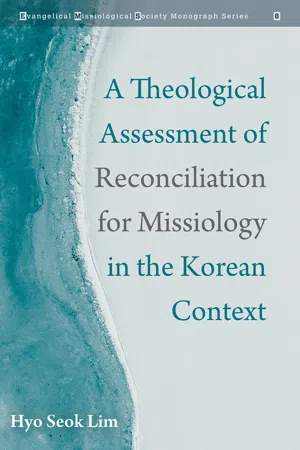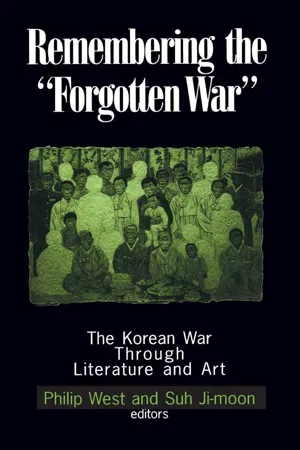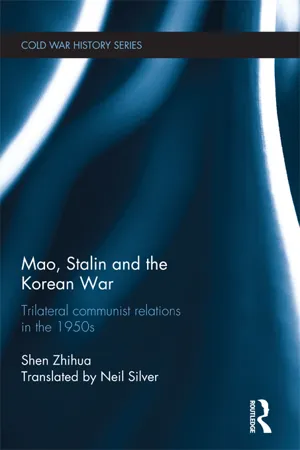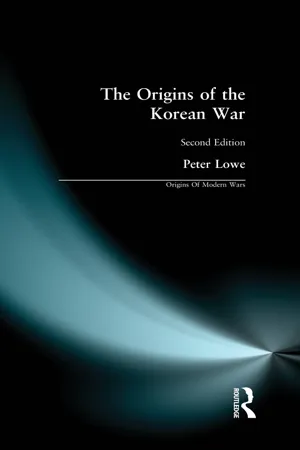Causes of the Korean War
The causes of the Korean War can be attributed to the division of Korea after World War II, with the North being influenced by communism and the South by capitalism. Tensions escalated due to border skirmishes and ideological differences, leading to the outbreak of the war in 1950. The involvement of global superpowers, particularly the United States and the Soviet Union, further fueled the conflict.
7 Key excerpts on "Causes of the Korean War"
- eBook - ePub
The Routledge Handbook of American Military and Diplomatic History
1865 to the Present
- Christos Frentzos, Antonio Thompson, Christos Frentzos, Antonio Thompson(Authors)
- 2013(Publication Date)
- Routledge(Publisher)
...Part VII The Korean War and its Aftermath 23 The Korean War, 1950–1953 A Historiographical Summary James I. Matray On July 27, 1953, an armistice halted the fighting in Korea. Coincidentally, interpretive peace also was taking hold among historians and political scientists on the causes, course, and meaning of the Korean War. Serious debate did not begin until scholars had rejected the credibility of an orthodox judgment that for almost two decades dominated accounts of the Korean conflict. Prior to the 1970s, few histories challenged President Harry S. Truman’s public declaration on June 27, 1950 that the North Korean attack on South Korea proved that “communism has passed beyond the use of subversion to conquer independent nations and will now use armed invasion and war.” 1 To date, sharp differences persist on almost every critical issue, but with two notable exceptions. First, Korean War scholars have reached agreement that this conflict marked a watershed in postwar international affairs, militarizing the Soviet-American competition and extending the Cold War to the entire world. Second, a consensus now prevails that the origins of the Korean conflict date from at least World War II. By contrast, the most important question that has constituted for some time the great divide in the literature on the Korean War is whether it was more an international conflict or a civil war. Cold War assumptions influenced the authors of a long list of overviews that presented an orthodox interpretation of the Korean War before the release of archival documents. During the decade after the armistice, Rutherford M. Poats, John Dille, and Robert Leckie published straightforward narrative accounts of the conflict, congratulating the United States for acting to halt Communist expansion. Establishing an early interpretive baseline in 1963, T.R. Fehrenbach, in a full-length study, explained that the United States was not prepared militarily or mentally to fight a limited war in Korea...
- eBook - ePub
- Charles K. Armstrong(Author)
- 2013(Publication Date)
- Routledge(Publisher)
...5 The Korean Crisis The two Koreas were born in crisis. The promise of liberation from Japanese colonial rule in 1945 was quickly overshadowed by the political division of the country into two mutually antagonistic states in 1948. Just two years later, the Korean War—a devastating but localized hot war in the emerging global Cold War—solidified that division, and consolidated the two Korean regimes in their respective Cold War blocs. Ever since, and despite the termination of the Cold War as a global conflict in the early 1990s, the Korean peninsula has been a tinderbox of military confrontation, one of the few places in the world where a local conflict could draw in major nuclear-armed states and lead to a region-wide war. Nowhere else on earth has national division been so acute, antagonism so bitter, cross-boundary contact so limited, or mutual suspicion so high as on the Korean peninsula. Despite some progress toward peaceful coexistence (to use that classic Cold War phrase) since the early 1970s, when Sino-US rapprochement opened up the space for North-South contacts on the Korean peninsula, the two Koreas remain on a semi-war footing. The existence of such national division and armed confrontation in a post-Cold War world seems paradoxical, but the still-unresolved Korean crisis arose from the specific encounter between local Korean conditions and the contradictory and uneven forces of globalization, a mix that has had particularly disastrous results for Korean peace and unity. For over sixty years, the Korean crisis has merely been contained, not resolved; resolution, despite several promising beginnings, has yet to be achieved. In other words, the crisis of Korean division is not merely an epiphenomenon of the Cold War...
- Hyo Seok Lim(Author)
- 2021(Publication Date)
- Pickwick Publications(Publisher)
...6 The Divided Contexts of the Korean Peninsula A Brief History of National Division in Korea From Liberation to the Korean War A fter the brief joyful moment of national liberation from Japanese forceful occupation on August 15, 1945, the Korean peninsula soon became entangled in nationwide “political and ideological division” under the Cold War’s influence. 1177 As Japan was defeated in the Pacific War by the Allied forces, the Union of Soviet Socialist Republics (USSR) and the United States (US) began an ideological contest on the Korean peninsula, each of whom were concerned that Korea might be ideologically taken by the other party. 1178 Bruce Cumings discusses this as follows: There was no historical justification for Korea’s division: if any East Asian country should have been divided it was Japan (like Germany, an aggressor). Instead Korea, China, and Vietnam were all divided in the aftermath of World War II. There was no internal pretext for dividing Korea, either: the thirty-eighth parallel was a line never noticed by the people of, say, Kaesŏng, the Koryŏ capital, which the parallel cut in half. And then it became the only line that mattered to Koreans, a boundary to be removed by any means necessary. The political and ideological divisions that we associate with the Cold War were the reasons for Korea’s division; they came early to Korea, before the onset of the global Cold War, and today they outlast the end of the Cold War everywhere else. 1179 The Foreign Affair ministers of the US, the United Kingdom, and the USSR met from December 16 to 2 6, 1945 to discuss the issue of Korea...
- eBook - ePub
The Korean Peace Process and Civil Society
Towards Strategic Peacebuilding
- Dong Jin Kim(Author)
- 2018(Publication Date)
- Palgrave Macmillan(Publisher)
...The re-established status quo has continued for over 65 years, and the root causes and tensions of the conflict remain. 54 Meanwhile, the geopolitical condition of the Korean peninsula following the Korean War has not been favourable for North and South Korea in finding options for resolving their conflict beyond a zero-sum formula. According to Samuel Kim, the Korean War was instrumental in the rise of the US, the Soviet Union, China, and Japan to great powers during the Cold War era. The US and the Soviet Union established superpower identities in a bipolar world. China’s participation in the war restored its status as a strong state in the communist bloc. Japan was able to reinstate its sovereignty earlier than expected and become a successful economic power in the capitalist bloc, furthered by the war economy as a logistical base and manufacturing centre for US war supplies. North and South Koreas belong to separate blocs, and the experience of the Korean War consolidated Cold War identities in their respective societies. 55 Domestically, the political leaders of the DPRK and the ROK used the Korean War and subsequent Cold War to strengthen their own political power. Lankov says, before the war, although he was the premier, Kim Il-sung was one of many communist leaders, but following the war, he became the only leader. As a result of the conflict situation Kim was able to promote his guerrilla friends and eliminate political competition. 56 Hong says, the war similarly helped Rhee Syng-man, who was facing strong political opposition, to rally public support and to become an authoritarian leader by emphasising the communist threat. 57 The Dictatorships As we discussed in Chapter 2, from the perspective of Galtung, negative peace is likely to be bought at the expense of positive peace. In order to maintain absence of war achieved by peace or an armistice agreement, armed forces would not be allowed to cross an armistice line...
- eBook - ePub
Remembering the Forgotten War
The Korean War Through Literature and Art
- Philip West, Suh Ji-moon, Donald Gregg(Authors)
- 2015(Publication Date)
- Routledge(Publisher)
...Although much weakened during Japanese colonial rule, classes continued to exist, exercising practical and psychological influence on social and individual life. But the Korean War made everyone paupers, placing everyone back at the same starting line. Social ethics also changed as a consequence of the war. American materialism and pragmatism supplanted the Confucian respect for propriety and decorum. The war, which generated a sense of life having to be lived in the present moment and of the meaninglessness of regard for convention, also destroyed a great number of sexual inhibitions, creating a sea-change not only in patterns of human relations but in human psychology and values as well. Yi Mun-yŏl speculates that the typical Korean reaction to the war was bewilderment and self-abandon. Koreans had a sense that the war was neither caused by them nor fought for them. Rather, the war originated as an ideological clash that did not begin in Korea. But the attitude of Koreans toward the war has changed greatly in the course of the half-century since the war. In the fifties, of course, all literature was strongly anticommunist. In the sixties, such a simple, black-and-white viewpoint was no longer convincing, so a kind of neutral outlook began to emerge, the most prominent example of which is The Square (Kwangjang, 1960) by Ch’oe In-hun. In this landmark novel, the hero leaves his hometown in the North and escapes to the South, fleeing the repressive climate of North Korea. But he becomes disgusted with the materialism and corruption of South Korea. When the Korean War breaks out, he joins the army, eventually becoming a POW. Given the choice between North Korea, South Korea, and a neutral country for repatriation, the hero chooses the last option...
- eBook - ePub
Mao, Stalin and the Korean War
Trilateral Communist Relations in the 1950s
- Shen Zhihua, Neil Silver(Authors)
- 2012(Publication Date)
- Routledge(Publisher)
...As they see it, Stalin assessed that the United States could now only concern itself with Chiang Kai-shek’s fate on Taiwan, and would not want to be drawn into a conflict on the Korean peninsula. Like others, they argue that another key factor was the Soviet Union’s breakout from the American nuclear monopoly. This meant that America could no longer use the nuclear threat against the Soviet Union. 3 Russian scholar E. P. Bajanov has argued that by 1950 the maturation of the Cold War led the Soviet Union to embrace the outbreak of war on the Korean peninsula. Stalin, in Bajanov’s view, regarded the newly established NATO as a threat to the Soviet Union. As a counter strategy, Soviet control of Korea would weaken U.S. control of Japan. And, the Communist victory in China seemed to ensure success in Korea, especially at a time when Stalin was also influenced by his recent acquisition of nuclear weapons and the American loss of China. Russian–American scholar Sergei Goncharov has disputed that the Soviet acquisition of nuclear weapons and the establishment of NATO heavily influenced Stalin’s new Korea strategy. He points instead to the impact on Soviet calculations to President Truman’s January 5, 1950 statement and, above all, to Secretary of State Acheson’s January 12, 1950 National Press Club speech, which placed Korea outside the American defensive perimeter. However, this was not the only factor, argues Goncharov. The situation in Germany and Europe, and concern about Japan, also played a role. The American scholar John Garver has pointed to Japan as the main reason for the change in Stalin’s formerly cautious approach, arguing that Moscow believed that by 1950 the U.S. was intent on turning Japan into a forward U.S...
- eBook - ePub
The Origins of the Korean War
Second Edition
- Peter Lowe(Author)
- 2014(Publication Date)
- Routledge(Publisher)
...115, 174. 25. See E. Bajanov 'Assessing the Politics of the Korean War 1949-51' in J. G. Herschberg (ed.) The Cold War International History Project Bulletin, Issues 6-7, The Cold War in Asia (Washington, D.C., 1996) p. 87. 26. Ibid., pp. 212-13. Between May and June 1950 substantial Soviet aid was dispatched to the DPRK. Existing Soviet military personnel were replaced with men possessing battle experience. The plans for the North Korean offensive were drawn up jointly by Russian and DPRK officers. 27 Kathryn Weathersby argues that Stalin's decision to support Kim II Sung was motivated by fear and insecurity rather than confidence. Stalin feared that, unless the DPRK moved first, then Rhee might implement his shrill threats and an attack from the ROK to the north might produce a situation he could not control. A deeper defensive motive resulted from the tense relations between the Soviet Union and China. Stalin was determined to prevent rapprochement between the United States and China and this rendered action in Korea desirable. 28 27. Ibid., pp. 142-7 and Anthony Farrar-Hockley, The British Part in the Korean War, vol. 2, An Honourable Discharge (London, 1995), p. 3. 28. Kathryn Weathersby, Soviet Aims in Korea and the Origins of the Korean War, 1945—1950: New Evidence from Russian Archives, Cold War International History Project, Woodrow Wilson International Center for Scholars (Washington DC, 1993), p. 29. Role of China This leads us to consider the role of China. Kim II Sung had no desire to encourage Chinese action. He visited Peking in May 1950 and informed Mao Tse-tung of his designs in broad terms. 29 Kim stated that he was confident of success without having to request Chinese intervention. This is profoundly ironic, given the course of events subsequently. Mao's attitude to the coming of the war in Korea was influenced heavily by the problem of Taiwan - another example of the fusing of the two crises in the summer of 1950...






